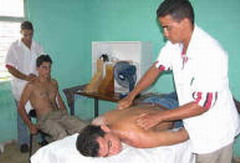Cuba offers three levels of physiotherapy training
- Submitted by: admin
- Health and Medicine
- 05 / 04 / 2007

There are three levels in the physiotherapy course offered in Cuba. The first level is called basic technician and is attained after one year of intensive hands-on training. The second level, (superior) technician is attained at the end of the third year. If you continue to the fifth year you would complete the third and final level which is called 'Licensing'. This final level is a specialization. Please note that the only level requiring supervision of a Physiotherapist is the first level (basic technician), since the technician (second level) is already a qualified professional in Physiother-apy and Rehabilitation. Also, the teachers are persons with sometimes over 30 years experience and the resources and equipment available are the most technologically advanced. Cuba is world renowned for its excellence in the medical field and there are many hospitals and centres specializing in Physiotherapy and Rehabilitation.
I would like to point out also that just because the terminology used in Cuba does not have the exact words or the exact translation in the English Language, one cannot decide that the Cubans are not qualified enough. It is also unfair to compare a Cuban graduate who has studied for at least 3 years to a Guyanese who has passed an 18-month Rehabilitation Assistant's course and say that the Cuban is either below, the same as, or only slightly above the level of the assistant. Especially when you do not have the knowledge of what the Cuban's training entailed. There is most definitely a very vast difference in the training between the two considering alone the resources available to each.
Persons from all over the world study in Cuba. Even Jamaica, where Guyanese have gone to study Physiotherapy, sends persons to Cuba to study.
To fully make my point I'll leave you with a question.
If the Cubans are below or just above the level of the assistant course offered in Guyana, why then does the Guyanese government find it necessary to bring Cubans to work on contract at the Georgetown hospital and other centres, and how come to this day Guyana can only offer a Rehabilitation Assistant's course and not a full degree in Physiotherapy and Rehabilitation?
Please note that Physiotherapy is only one aspect of Rehabilitation which is a very wide field and entails the use of many different techniques among other things. It is a medical career where the diseases, their characteristics, causes and treatments have to be studied in detail, along with human anatomy and physiology, biochemistry and even psychology.
Comments